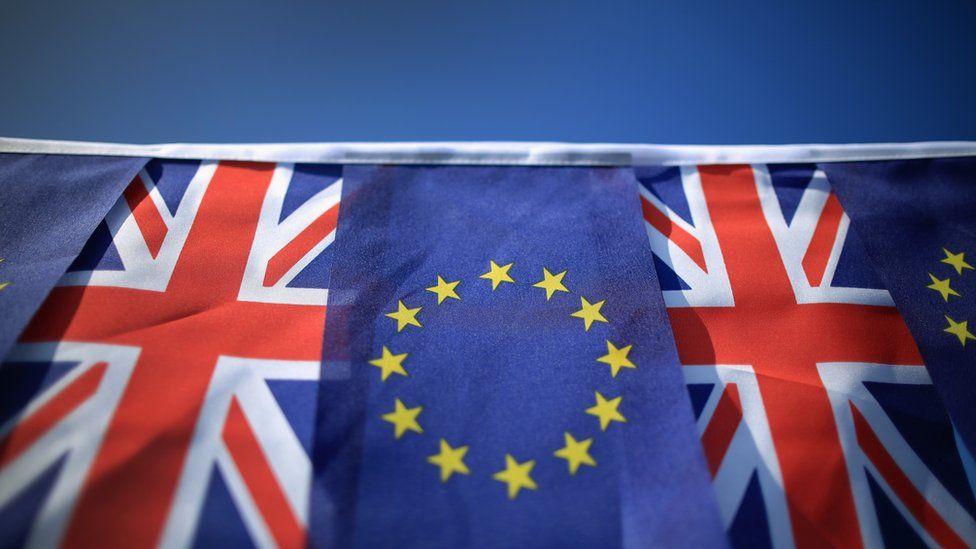IMF: EU exit could cause severe damage
- Published

The UK's exit from the European Union could cause "severe regional and global damage", the International Monetary Fund has warned in its latest outlook.
A so-called "Brexit" would disrupt established trading relationships and cause "major challenges" for both the UK and the rest of Europe, it said.
The IMF said the referendum had already created uncertainty for investors and a vote to exit would only heighten this.
Vote Leave said the IMF had been "consistently wrong" in past forecasts.
The IMF, one of the main pillars of the global economic order with a mandate to oversee the international monetary and financial system, also cut its UK growth forecast.
It now expects 1.9% growth in the UK this year, compared with its January estimate of 2.2%. For next year, it expects 2.2% growth, unchanged from its earlier forecast.
If the 23 June referendum in the UK were to produce a vote in favour of leaving the EU, the IMF would expect negotiations on post-exit arrangements to be protracted, which it warned "could weigh heavily on confidence and investment, all the while increasing financial market volatility".
It also believes a UK exit from the EU would "disrupt and reduce mutual trade and financial flows" and restrict benefits from economic co-operation and integration, such as those resulting from economies of scale.
However, the Fund said that domestic demand, boosted by lower energy prices and a buoyant property market, would help to offset the impact on UK growth ahead of the EU referendum.
Chancellor George Osborne said the IMF's comments reinforced the case for staying. "The IMF has given us the clearest independent warning of the taste of bad things to come if we leave the EU," he said.
Meanwhile, Prime Minister David Cameron tweeted: "The IMF is right - leaving the EU would pose major risks for the UK economy. We are stronger, safer and better off in the European Union."
Analysis by BBC economics editor Kamal Ahmed:
Maurice Obstfeld, economic counsellor to the International Monetary Fund and the organisation's chief economist, says there could be "severe regional and global damage" if Britain were to vote to leave the European Union.
An exit would present "major challenges" and a prolonged period of uncertainty which would "weigh" - that is have a negative effect - on confidence and investment.
Market volatility could increase, trade could be damaged and economic growth undermined.
Mr Obstfeld, an expert in international finance, is a former economic adviser to President Barack Obama.
And, as one of the top 40 economists cited in the world for his research, has muscle in this arena.
Vote Leave, the group campaigning for the UK to leave the European Union, criticised the IMF's findings saying it had "been consistently wrong in past forecasts about the UK and other countries".
"The IMF has talked down the British economy in the past and now it is doing it again at the request of our own Chancellor. It was wrong then and it is wrong now," said Vote Leave chief executive Matthew Elliott.
"The biggest risk to the UK's economy and security is remaining in an unreformed EU which is institutionally incapable of dealing with the challenges it faces, such as the euro and migration crises."
UKIP leader responds to EU exit warning
UKIP leader Nigel Farage also criticised the IMF, saying it had "lost its way" in recent years and had been "effectively hijacked" by pro-EU bosses.
Former chancellor Lord Lamont also dismissed the IMF's concerns as "assertions… for which there is no real evidence".
He said the IMF was "very closely connected to the European Union" and was therefore "bound to reflect their views".
"The idea that we wouldn't continue trading on a perfectly normal basis is just fantasy," he added.
In contrast, Britain Stronger In Europe, which is campaigning for the UK to remain within the EU, said businesses and families should heed the IMF's warning.
"This is the clearest evidence yet about the danger of Britain leaving Europe from the word's most respected financial body," said former Labour foreign secretary David Miliband, speaking at an event held by the group.
Other major bodies' assessments on the impact of a possible Brexit have been less severe than the IMF's.
Credit ratings agency Moody's recently said the the impact of the UK leaving the EU would be "small" and was unlikely to lead to big job losses.
But the CBI has warned a British exit from the EU - known as a "Brexit" - could cost the UK economy £100bn and nearly one million jobs.
- Published12 April 2016
- Published12 April 2016
- Published12 April 2016
- Published22 March 2016
- Published21 March 2016